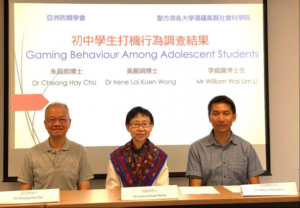
The Asian Association of Addiction Prevention (AAAP) and the Felizberta Lo Padilla Tong School of Social Sciences, Saint Francis University (SFU) jointly conducted a survey in March to July, 2023. 1046 secondary school students filled a gaming survey questionnaire. Results indicate that 97% of the survey participants played video games. 48% used tablet computers to play online games, 84% played mobile games, and only 27% used game consoles to play video games.
Male students spent more time on gaming than female students. On Monday to Friday, which are school days, male students spent an average of 4.2 hours per day on gaming, including 3 hours of playing themselves, and 1 hour watching others play, such as e-sports contests. Female students spent an average of 2 hours per day playing and 48 minutes watching. On weekends and vacations, both male and female students spent more time playing and watching.
Secondary students played games mainly for fun (74%), relieving boredom (65%), killing time (56%), reducing stress (55%), and socializing (35%). The benefits of playing computer games are many, including: having a happier life (67%), feeling successful (53%), being more responsive (52%), meeting new friends (51%), and thinking faster (42%). However, they have also suffered from the negative consequences including head and neck pain (35%), poor academic results (35%), fatigue (34%), reduced exercise (28%), lack of sleep (27%), lower back pain (26%), blurred eyesight (25%), poorer temperament (23%), poorer mental status (23%), and quarrels with others (21%).
76% of gamers preferred multiplayer games, while only about 30% preferred to play video games alone. During the COVID outbreak, 68% of respondents admitted to spend more time on gaming, and more than half (56%) admitted to be addicted to gaming.
According to the internationally recognized scale for assessing the degree of addiction to gaming, 30% gamers have reached the level of addiction, and 11% show pathological symptoms, including increasing the amount of time they spend on gaming, escaping from the unpleasant realities of life, and neglecting other important activities (e.g., studies). The findings also suggest that the following factors increase the risk of addiction: lack of self-control, low self-esteem and lack of satisfaction in life.
With the addition of e-sports to the Hangzhou 2022 Asian Games, the love for gaming has grown even more among teenagers. The survey also confirms that playing video games has become a daily entertainment activity for secondary school students, and is considered to be a very beneficial social behavior. However, addiction to gaming can be harmful to physical and mental health, affecting academic performance and destroying relationships. The research team urges to strengthen home-school cooperation to provide more physically and psychologically beneficial activities for students, and to cultivate children's self-control and self-esteem from an early age to enhance life satisfaction at home and at school, so as to enable children to grow up happily and healthily, and to effectively develop anti-addiction ability to prevent addiction to gaming. Organize public education and encourage help-seeking behavior, so that students and affected families can receive appropriate counseling or treatment at an early stage. It is advisable for the government to increase funding to support research on addictive behaviors in order to identify protective and risk factors for addictive behaviors. The results of these studies will help establish evidence-based intervention programs and strategies to make preventive education and practice more effective.